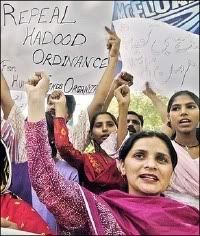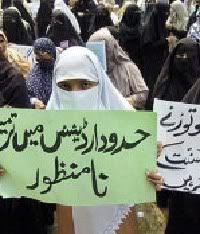 The women’s protection bill of Pakistan — which will dramatically alter the rape laws of Pakistan — has a chance of being passed this coming Monday. The bill is an attempt to reform the draconian rape laws of Pakistan from 1979, passed by then dictator Zia ul Haq under the auspices of the religious establishment (part of the hudood ordinance).
The women’s protection bill of Pakistan — which will dramatically alter the rape laws of Pakistan — has a chance of being passed this coming Monday. The bill is an attempt to reform the draconian rape laws of Pakistan from 1979, passed by then dictator Zia ul Haq under the auspices of the religious establishment (part of the hudood ordinance).


This has been a contentious issue in Pakistan (see my commentary on it here). I have been in correspondence with individuals who are involved in the Women’s Protection Bill. While on one hand they have had to contend with the religious establishment, they have also ran into opposition by some liberal groups, and international NGO’s like Human Rights Watch, who find the proposed amendments inadequate.
What the reformists are trying to explain, however, is that while total repeal of the bill would be wonderful, politics is a process, and that means taking whatever progress that can be gotten right now. While concerns about the fact that the bill is being pushed through by a dictator (Musharraf) are valid, they are unfair in light of the tremendous abuses that will be alleviated if this bill is passed. In the short term, the reformists — and those backing the bill — need our support. Later, more progress can be made.
In an op-ed that appeared in The Daily Times today (10 September, 2006) Feisal Naqvi points out:
…the response from women’s groups to the proposed Women’s Protection Act has either been hostile or at best, tepid. Instead of supporting the bill, women’s groups have only reiterated their demand for the complete repeal of the Hudood Ordinance. What these groups forget is that politics is the art of ‘the possible’. The Women’s Protection Act may not be perfect but it will certainly bring relief to millions of oppressed women. In any event, the fight for repeal can always be carried on later.
The reformists need to be recognized for the good they have achieved despite the enormous difficulties, and not to be criticized for what they have failed to achieve. The full article by Feisal Naqvi in The Daily Times is worth a read because it clearly explains what the issues are and how they are being dealt with in the new law. It concludes:
If all goes according to the government’s plan, much of what is undesirable in the Offence of Zina (Enforcement of Hudood) Ordinance, 1979 (to give the law its full name) will be quietly gutted through the proposed Protection of Women’s Act… The proposed law marks the absolute limit of what is possible in terms of today’s political climate. More importantly, the Protection of Women’s Act is not a whitewash job: instead, it addresses and fixes the major sources of women’s oppression under the Hudood Ordinance.
The best thing to do right now is to support the efforts of the reformists and later carry their torch further. It would be a terrible tragedy if after decades of efforts the amendments were tabled due to inadequate support by progressives. Well intentioned people around the world need to express their support. (For more see: ‘The Right To Own Women’ and Women’s Protection Bill Cheat Sheet). [Also see earlier ATP Poll on related issue].
Ali Eteraz describes himself as “a continental philosopher, essayist, novelist, student of Islamic arts, philosophy, jurisprudence and a practitioner of global nomadism” and blogs under this pseudonym at Eteraz, where you will find much on this and related subjects.



















































[quote comment=”10752″]Nobody is coming to rescue someone else. At one side you make a statment and on other hand you ask other to shutup. Quit your trolling and whinning attitude and growup[ If you can in the presence of your enlightened scholars][/quote]
Perhaps passing of women’s bill has placed a foot on someone’s tail. And perhaps it’s better not to appear Mullah officially – no longer viable as no dollars for jihad but kick in the backside. Oh…the joys of enlightened moderation…
Nobody is coming to rescue someone else. At one side you make a statment and on other hand you ask other to shutup. Quit your trolling and whinning attitude and growup[ If you can in the presence of your enlightened scholars]
[quote comment=”10650″]
then why do you keep poking your nose again and again? Stay away and smoke weeds.[/quote]
Dumb coming to the rescue of the dumber.
Weed? Now this I forgot to enroll in a madrassa for.
Please do not reply with further clichés. I am sick of them already.
then why do you keep poking your nose again and again? Stay away and smoke weeds.
Muhammad Khurram, are you capable of writing a single sentence of your own? Every thing you said is the over used mullah rhetoric that we have been listening from the day we were born. Three problems with all this;
1. No proof provided that Hudood laws are actually OK only their use is not. There are plenty of arguments form the legal community as to why hudood law itself is defective. Please search and read the relevant articles. A lot has been said on the TV media as well.
2. No proof provided that Islam is the only/first religion that provided rights to the women. Have you studied *all* other religions to claim what you claimed above? Are you saying other prophets jesus/moses/ibraheem and the rest of the 124,000 prophets that came did not care about women or did not treat women well or with respect? I highly doubt it and consider it almost blasphemy to imply this. Of course not with death penalty in mind, just academically speaking. ;)
3. The current behaviour of many Muslims does not give the goody goody impression of Islam that you have depicted above.
Please do not reply with further clichés. I am sick of them already.
Thanks